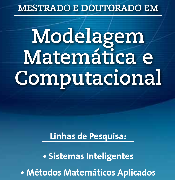
PRESENTATION
The theme of Mathematical and Computational Modeling has been recognized as particularly suitable for the development of interdisciplinary research. It allows the formation of heterogeneous groups, with researchers from different areas of knowledge, promoting the integrated study of various modeling problems. As a consequence, there is the synthesis of techniques, the standardization of vocabulary, and the creation of more comprehensive concepts. This provides an expansion of the frontiers of knowledge, which would not be possible without the constitution of such groups.
ABOUT PPGMMC
The Graduate Program in Mathematical and Computational Modeling (PPGMMC) is characterized by the development of interdisciplinary research. This particularity is evident when considering that:
• The concepts and techniques of modeling are not characterized by their universality, but what is observed is a great dispersion of techniques, non-standardized vocabulary, and significant conceptual differences;
• The formation of non-homogeneous groups with researchers from different areas of knowledge for the integrated study of modeling problems has been making possible the transfer of techniques, vocabulary, and concepts from one area of knowledge to the others, generating new knowledge and implying the emergence of this new discipline;
• The synthesis of techniques, the standardization of vocabulary, and the creation of more comprehensive concepts provide an expansion of the frontiers of knowledge.
RESEARCH LINES
A. Intelligent Systems
This research line seeks to understand, from the study of human behavior and natural systems, what constitutes "intelligent behavior," and how such behavior can be incorporated into computational systems. Thus, it seeks to appropriate and recontextualize a body of knowledge and best practices from other disciplines and/or research areas. The methods and techniques derived from linguistic analysis, cognitive models and processes, machine learning, semantic networks, fuzzy logic-based methods, artificial neural networks, distributed processing, and dynamic systems make up the theoretical framework of this research line. Currently, the main topics of interest in this research line are: multi-objective optimization; software engineering; computational neuroscience; artificial life; knowledge representation; combinatorial optimization; computational intelligence; artificial neural networks; fuzzy systems; control systems; evolutionary computing; linear optimization; probabilistic analysis of systems; multi-agent systems; complex networks.
Faculty Members in this Research Line:
- Alisson Marques da Silva
- Adriano Chaves Lisboa
- Anísio Mendes Lacerda
- Douglas Alexandre Gomes Vieira
- Elisângela Martins de Sá
- Elizabeth Fialho Wanner, PhD, UFMG
- Flávio Vinícius Cruzeiro Martins
- Gray Farias Moita, PhD, Imperial College
- Gustavo Campos Menezes
- Henrique Elias Borges, PhD, UFMG
- Marcone Jamilson Freitas Souza, PhD, UFRJ
- Paulo Eduardo Maciel de Almeida, Dr. Eng., US P
- Rodrigo Tomás Nogueira Cardoso, PhD, UFMG
- Sérgio Ricardo de Souza, PhD, Unicamp
- Thiago Magela Rodrigues Dias
- Vinícius Fernandes dos Santos, PhD, UFRJ
B. Applied Mathematical Methods
This research line is characterized by the use of mathematical techniques and computational simulation methods in interdisciplinary applications for system modeling. The resulting models may be linear or nonlinear, described by differential or algebraic equations, probabilistic or deterministic, discrete or continuous, resulting from simulation methods or modeling of physical, economic, industrial, and biological systems.
Currently, the main topics of interest in this research line are: models of physical and biological dynamic systems; approximation methods based on variational principles or discretization; numerical methods for differential equations; methods for computational algebra; simulation and Monte Carlo methods; probabilistic analysis of systems; signal and image processing; web systems; data mining; complex systems; granular materials; quantum physics; econophysics; distributed systems; robotics; computer vision; mathematical physics; quantum information.
Faculty Members in this Research Line:
- Adriano César Machado Pereira, PhD, UFMG
- Allbens Atman Picardi Faria, PhD, UFMG
- Antônio Paulo Baeta Scarpelli
- Arthur Rodrigo Bosco de Magalhães, PhD, UFMG
- Breno Rodrigues Lamarghere Galvão, PhD, University of Coimbra
- Flávio Luis Cardeal Pádua, PhD, UFMG
- Giancarlo Queiroz Pellegrino, PhD, UNICAMP
- José Geraldo Peixoto de Faria, PhD, UFMG
- José Luiz Acebal Fernandes, PhD, UFMG
- Leonardo dos Santos Lima, PhD, UFMG
- Thiago de Souza Rodrigues, PhD, UFMG
- Thiago Gomes de Mattos, PhD, UFF
For further information please contact us.: https://bit.ly/42lIOJ2



